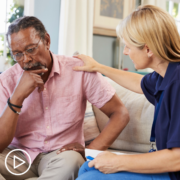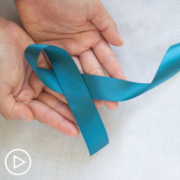Tools for Managing Prostate Cancer Fear and Anxiety
Tools for Managing Prostate Cancer Fear and Anxiety from Patient Empowerment Network on Vimeo.
Fear and anxiety are common feelings that arise while living with prostate cancer. Social worker Linda Mathew explains how she helps patients improve quality of life while living with prostate cancer.
Linda Mathew is a Senior Clinical Social Worker at Memorial Sloan Kettering Cancer Center. Learn more here.
See more from The Pro-Active Prostate Cancer Patient Toolkit
Related Resources

|

|

|
Transcript:
Linda Mathew:
The common fears and worries that they have are – form the support group itself, the main ones that we always hear are the incontinence and erectile dysfunction. So, we really focus on what that means for them as men because it is their manhood, and their biggest concern is “No one told me I was going to have incontinence for this long. I thought it was going to end after a couple months of recuperation from surgery.”
And, we remind them your body has just gone through a shock in terms of having a prostatectomy, and so, it’s your body having to realign and remember what to do again in terms of taking care of itself. Just the same way as in erectile dysfunction, that is possible after having a prostate surgery – prostatectomy, so we remind them there are resources we have here to help address sexual health. So, I am obviously going to refer our patients to our men’s sexual health clinic, which is run by Dr. Mulhall and his team. So, those are the two areas that they really bring up, and it’s also in terms of “Can I have a relationship?” if they’re single, or “How do I let my significant other know that I’m having these issues?”
And, I always – I’m always encouraging our patients “Let’s talk about how to have that conversation if you’re scared of having it. What does that look like for you? What do you think is the worst thing that would be said to you? Let’s approach it from that end in terms of saying here’s some tools for you to have that discussion with your significant other.”
I start off with validating their feelings. I think that’s really important for our male population, is just that it’s okay to feel anxious, and anxiety is real, and with this population, PSA anxiety is very real. So, it’s going in for those three-month checkups to say, “How is my PSA doing? Am I in the right track?”, and just giving them that validation like, “It’s normal. What you’re feeling is normal.”
It relieves a lot of their anxiety because then, they’re thinking, “Okay, I’m not the crazy one here. Yes, what I’m going through – this uncertain journey that I’m on – everyone’s feeling this, no matter what the diagnosis is.” And then, I just – we talk about what it means for them, like what does this cancer diagnosis mean for them. Most of our men are always like – they want something that can be like there’s a solution-oriented process to it, and there’s no solution-oriented process to this, so it’s about how do you sit in that ambiguity, that uncertainty of this journey, and what can you do for yourself that you feel like you’re in control of?
So, for our prostate cancer patients, knowing that there are other people out there that they can talk to is a relief for them, that they’re able to know that there might be a group of men who can say, “Hey, I was there right where you were when I was initially diagnosed in terms of anxiety, in terms of not knowing how to make a decision about treatment plans or treatment options, but maybe my two cents can help you.”
A lot of patients that come to my support group, which is through the Resources for Life After Cancer program, really find that connection helpful because you’ve been given so much information, and you’re feeling overwhelmed by “How do I make this choice – a good choice – for myself?”, connecting with other men who’ve been given the same options, and made a decision, and see where they are now in treatment helps release – decrease the anxiety, but also gives them some relief in terms of not feeling like there’s pressure to how to choose the right answer, or the right recommendation, or the right treatment plan.










